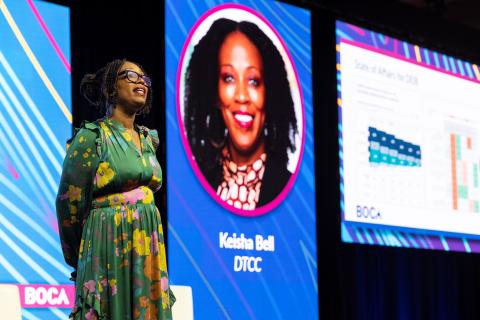A presentation at the FIA International Futures Industry Conference in Boca, Fla. on 16 March titled “Sponsorship to Help Drive DEI” discussed sponsorship as a valuable tool for driving diversity, equity, and inclusion in organizations.
Speaker Keisha Bell, managing director, head of talent management and diversity, equity & inclusion at the Depository Trust and Clearing Corporation (DTCC) led a critical discussion on sponsorship within organizations, highlighting the values of a diverse workforce in the financial services industry and outlining steps to take to drive a culture of sponsorship and create a more equitable and inclusive workplace.
She kicked off her presentation citing a 2022 McKinsey Women in the Workplace Study and focused on the reality Asian women and Black women face in the workplace. "Asian women and Black women are less likely to have strong allies on their teams. They are also less likely than white women to say senior colleagues have taken important sponsorship actions on their behalf, such as publicly praising their skills or advocating for a compensation increase for them."
Bell supplied further context surrounding diversity, equity, inclusion, and belonging (DEIB), emphasizing that despite modest progress in the corporate world, women are still dramatically underrepresented in leadership. However, the organizations that prioritize formal sponsorship for women and women of color, provide DEI training initiatives, and make consistent gains in women’s representation are more likely to have certain best practices in place.
Best practice initiatives include proactively supporting employee career development, fostering a sense of inclusion, and belonging, facilitating team conversations about diversity issues, combating bias in promotions and everyday activities, minimizing burnout, and checking in on employee well-being, among others.
Bell noted that sponsorship means "using your own social and professional capital to make someone’s story known by decision-makers who can influence their success."
Sponsors who believe in and advocate for their employees actively expand the employees’ capabilities, connections, opportunities, and more. If more women and women of color are supported and motivated in this manner, it could pave the way to more senior leadership roles for underrepresented workers and build a more diverse work environment over time.
Research from Coqual shows that relationships and networks are critical for development and advancement, and employees with sponsors are 20% more likely to feel a sense of belonging and 69% more likely to believe they can advance to a more senior position.
Bell ended the presentation by providing a roadmap on how to implement sponsorship within financial organizations from identifying diverse talent and articulating how sponsorship can help, to developing senior leadership and pairing sponsors with employees. Bell stressed the importance of communicating with diverse senior leaders about their experiences with sponsorship, listening to workers, and supporting equal opportunity and career growth.


